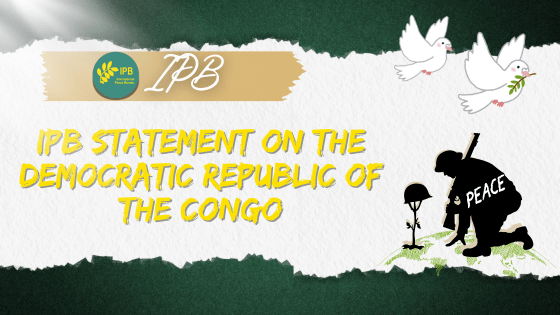The International Peace Bureau expresses deep concern regarding the advance of the Rwanda-backed M23 rebels in Eastern Democratic Republic of Congo including in the regional capital of Goma. To this day and despite international humanitarian law, humanitarian assistance remains blocked outside Goma, while the population is still deprived of access to drinking water, electricity, Internet, sufficient food and adequate health care – the capacity of hospitals is saturated. The ongoing violence not only endangers the stability and well-being of the people of the DRC but also threatens peace and security across the whole region.
Recent figures estimate at least 3,000 people have been killed and more than 2,880 injured. At least 2,000 bodies have already been buried by communities and according to WHO figures from February 4, there are 900 bodies still in the morgues of Goma hospitals. Many decomposing bodies remain in some areas, including the airport and Goma prison. About 76,000 people were displaced after the capture of Goma. To date, there are 329,000 IDPs present in the IDP site out of 405,000 before the capture of Goma. M23 rebels and their allies captured the city of Nyabibwe, located on the western shore of Lake Kivu in Kalehe territory (South Kivu), about 100 km from Bukavu and 70 km from Kavumu airport, on Wednesday, February 5, 2025, after intense fighting with the Armed Forces of the DRC. Pregnant women, children and vulnerable elderly people are living in precarious conditions, with limited access to food, drinking water and essential services. Humanitarian aid is struggling to reach them. As the fighting intensifies, entire families are taking refuge in churches, schools or other makeshift shelters in Goma with multi-sectoral humanitarian needs.
The roots of this conflict are based not only in ethnic divisions but in competing economic interests, especially access to mineral-rich areas, and open larger regional disputes. It is clear that the continued military advance will not resolve any of these issues but rather exacerbate the tensions and push the region further into conflict.
IPB expresses its solidarity with the affected communities and calls for an immediate ceasefire and global support for local and regional dialogue initiatives with the active involvement of civil society and particular community and women leaders. International actors must support diplomatic solutions, provide critical humanitarian aid, and refrain from pursuing their own interests at the cost of peace. Regional bodies such as the African Union, the Southern African Development Community (SADC), the East African Community (EAC) and indirect parties should promote common security – that no one nation or peoples will make themselves safer at the expense of another and that the wellbeing of all in the region depends on peace with one another. All parties must work to prevent the transfer of arms to the conflict parties. The solution lies in respect for international law and particularly territorial integrity, the respect for all ethnic groups, and local and regional peacebuilding initiatives supported by dialogue between the conflict parties.
IPB reaffirms its commitment to work alongside local partners, NGOs, humanitarian agencies and aid workers to provide life-saving support to the most vulnerable populations.
Your support can provide urgent aid to those in need by contributing to the GoGetFunding campaign organized by Women Concern (WOCO) in DRC, a member organization of IPB, and published by Rokhsaneh Madeira.
French Translation

